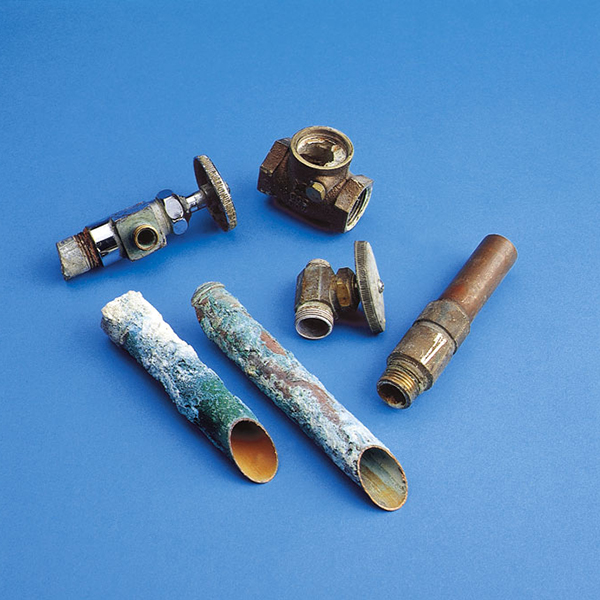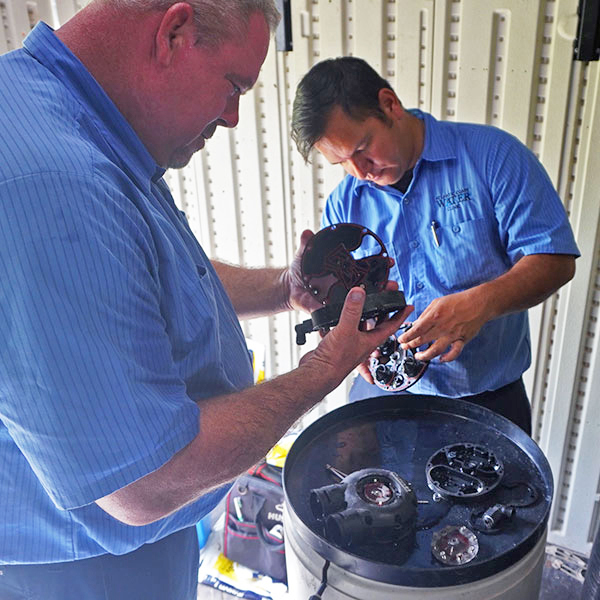Common Types Of Water Problems
Water in its pristine natural condition is clear without any odors or aftertaste, but it is not always the case for many homeowners. The Floridian and Surficial Aquafers are the groundwater source supplying public water systems and private wells throughout Southeast Florida and the Treasure Coast. Elevated mineral levels, deteriorating plumbing, chemicals, pollution, and other conditions can upset its delicate balance that can cause a variety of common types of water problems.
 Hard Water
Hard Water
Hard water is the most common water problem along the Treasure Coast that affects most homes and businesses. It is caused by high levels of calcium carbonate, manganese, and other minerals that naturally occur in the groundwater. Hard water is the culprit for several types of plumbing problems. It causes soap scum and discolors toilets, sinks, tubs, and fixtures with reddish-orange, black, or white stains. It also causes scale deposits to build up in the plumbing and hot water appliances, leading to more frequent repairs and premature replacements. Hard water also clogs pores irritating the skin and scalp and makes hair brittle.
Hydrogen Sulfide
Hydrogen sulfide or sulfur water is another common water problem, especially for private well owners. Its pungent “rotten egg” smell and unpleasant taste can make the water undrinkable. It also accelerates the corrosion of metal pipes and fixtures. The elevated levels of sulfates in the water can also produce stains on plumbing fixtures, appliances, laundry, and dishware. Since hydrogen sulfide can also indicate bacteria’s presence, installing a sulfur filter will help ensure the water is safe for consumption.
Low pH
Low pH or acidic water occurs when the pH balance falls below 7, its neutral value. Acidic water is a problem that typically affects surface water sources and private wells when frequent rainfall, chemicals, or minerals lower the water’s pH. It has an unpleasant metallic taste and causes blue-green stains on copper pipes. It is also very corrosive and can destroy copper pipes. A Kinetico® Neutralizer ensures the water remains balanced correcting problems associated with low pH.
Iron and Manganese
The Floridian Aquifer, the groundwater source for most of the Treasure Coast, naturally contains various minerals, including iron and manganese. However, rust from aging pipes can significantly increase iron and manganese levels in the water, which can give it an unpleasant metallic taste and earthy odor. It also creates rust stains on appliances, fixtures, and laundry. Consuming too much iron can also cause health problems.
Tannins
Tannins are produced by the fermentation of decomposing vegetation. It taints water with an earthy odor and color and sour taste. It is a common problem that residents with private wells in low-lying or coastal areas may experience when tannins from nearby farms or vegetation seep into the soil and groundwater.
Chlorine and Chloramine
Many public water utilities in South Florida are disinfecting the water with chlorine then adding ammonia to create chloramine to kill any waterborne bacteria present in the water. The chemical disinfection process can make water smell like bleach or ammonia. It also causes dry skin and hair. Unlike chlorine that dissipates rapidly, chloramine remains in the water longer and produces trihalomethanes (THM) and haloacetic acids, potential carcinogens. A dechlorinator and chloramine filter will remove its damaging effects, including foul odors, and improve the taste.
 Salty Water
Salty Water
Seawater intrusion in the groundwater is a common problem that homeowners in low-lying or coastal areas may experience. The abundance of chlorides in seawater binds with sodium, potassium, and other naturally occurring minerals, giving the water a salty taste. It can also cause skin and hair dryness.
If you are experiencing these or other water problems, you should obtain a comprehensive water analysis to diagnose the specific water problems. Once the water problem is diagnosed, a trained water specialist will recommend the best treatment solution to restore your water quality.


 772-283-4767
772-283-4767